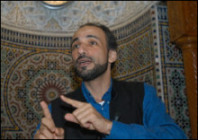 US government lawyers clarified some mysteries and deepened others in the case of Tariq Ramadan, a Swiss Muslim scholar and leading European theologian of Islam who has been barred by the Bush administration from traveling to the United States since July 2004.
US government lawyers clarified some mysteries and deepened others in the case of Tariq Ramadan, a Swiss Muslim scholar and leading European theologian of Islam who has been barred by the Bush administration from traveling to the United States since July 2004.
Papers the government presented at a hearing in a US court Thursday in New York revealed that, contrary to officials’ statements, a clause in the USA Patriot Act that bans any foreigner who “endorses or espouses terrorist activity” was not the reason Ramadan’s US visa was revoked. The government said it did not intend to bar Ramadan in the future based on that clause, sometimes called the ideological exclusion provision.
But the government also said Ramadan’s case had been and remained a national security matter, and that statements he made in recent interviews with US consular officials in Switzerland had raised new “serious questions” about whether he should be allowed to come to the United States. Neither the government’s documents nor its lawyer, David Jones, an assistant US attorney, explained why Ramadan was banned or provided any detail about the administration’s new concerns in his case.
The hearing, before Judge Paul Crotty in US District Court in New York, came in a lawsuit by the American Civil Liberties Union on behalf of three academic and writers’ organizations who had invited Ramadan to speak at conferences. The groups claim their constitutional rights have been violated because they cannot meet with Ramadan in the United States.
See also Islam Online, 14 April 2006
